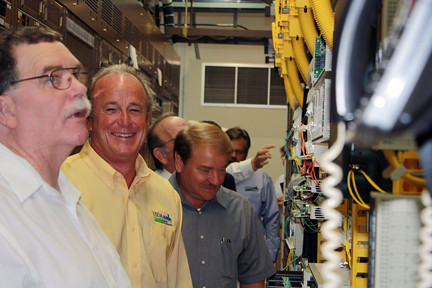By Bobby M. Goode, Tennessee State Director
Access to high speed Internet connections grows more important every day. For businesses in Rural America it can be the difference between success and layoffs.
Now a 60-year old telephone co-op and USDA Rural Development (RD) have teamed up to construct the fastest possible broadband network with fiber optic cable all the way to homes and businesses in three very rural counties on Tennessee's Cumberland Plateau.
During an event to announce the investment, Twin Lakes Telephone Cooperative (TLTC) General Manager Wayne Gassaway told the story of how the project got rolling about 10 years ago. "A lady called me, fussing that she couldn't get DSL service at her home in Squirrel Flat. Her dial up was no longer good enough.
"I've worked in all four time zones over the years. The rocks, trees, rivers and gorges—everything that makes this place so beautiful—also makes it really rough to install telephone lines, much less fiber-to-the-premises. It's the biggest challenge I've ever seen," Gassaway told us.
After looking into their options, co-op members decided it was their responsibility to invest in the best technology they could get their hands on. What started in some of the more populous small towns is now extending into harder to reach parts of Clay, Fentress and Pickett counties, thanks to funding through the American Recovery and Reinvestment Act funding ($16,076,833 infrastructure loan and a $16,076,834 grant).
The availability of the Recovery Act's lower interest rates and grant dollars puts the project years ahead of where it would otherwise be despite all the local dollars TLTC is investing on its own.
That's important because greater access to education, training, healthcare and business depend on the Internet. As Rep. Lincoln Davis pointed out "As a result of this strategic investment a lot of construction jobs will be created immediately and all kinds of good jobs and opportunities will be created as the system comes online over the next three years. TLTC believes nearly 350 jobs will be affected directly or indirectly by this project.
Subscribers will have access to the highest quality and broadest range of telecom services available. Over 4,000 homes and 1,300 businesses, including anchor institutions like hospitals, clinics, libraries, schools and colleges will receive broadband service.
Since its creation in 1951 with financing from USDA's Rural Utilities Service, TLTC service has grown from basic operator-assisted eight-party line connections to the full range of modern telecommunications options, including broadband.

